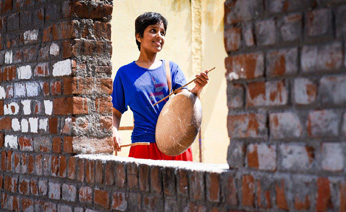In March 2016, a 22-year-old man was hacked to death in daylight on a crowded road in southern India for marrying a woman of a higher caste. His wife survived the attack and went on to testify against her parents and campaign against the scourge of caste.
Honour killings are nothing new, but the gruesome murder of Shankar, from the Dalit community in southern Tamil Nadu state, for marrying Kausalya, shocked India.
In December, six people, including Kausalya’s father, were sentenced to death for the “honour killing”. Kausalya now won’t rest until her mother is also convicted.
On the last day of his life, Shankar and Kausalya, woke up around nine in the morning in their village hut. They had been married eight months.
It was Sunday, and they travelled in a public bus to a local market in Udumalpet, some 14km (8.6 miles) away. They wanted to shop for new clothes for Shankar, who had to attend a function at his college next day.
The sun was beating down hard when they entered a clothes shop. She spotted a pink shirt and thought her husband would look good in it. As they walked out, Shankar spotted a mannequin in the shop window wearing a green shirt.
“I think I like this shirt better,” he said.
They walked back in again, exchanged the pink for the green, stepped out of the shop and began crossing a crowded road on their way back to take a bus home. But first, Shankar told Kausalya, he would like to treat her to her favourite chilli snack.
“Another day,” Kausalya said.
She had only sixty rupees (94 cents; 68p) in her purse, and they couldn’t afford it. So they decided to return home, where Shankar promised to cook her a special meal.
CCTV footage showed the couple walking briskly towards the road. But before they could cross, five men, riding on two bikes, halted behind them. Four of the men sauntered up to the couple and attacked them with long knives. The casualness with which the murderers fell upon them was chilling. They slashed the couple as if they were pruning bushes.
Bleeding profusely, Shankar scrambled to run away. Kausalya limped towards a stationary SUV, when she was felled again by her assailants.
It was all over in 36 seconds. The men returned to their motorcycles and left leisurely as a crowd began to collect. The police later found six people came on three bikes, two bearing false number plates. Five of them attacked the couple, while one man kept watch.
An ambulance arrived soon and scooped the couple off the blooded-slicked tarmac. On the way to the hospital, 60km away, the medic inexplicably sat in the front seat. On the metal stretcher, Kausalya, her vision blurring, held the IV drip. Shankar lay still.
“Rest your head on my chest,” he rasped. Kausalya moved to his side.
Minutes later, as the ambulance entered the hospital, Shankar stopped breathing.
Autopsy surgeons found 34 cuts and stab wounds on Shankar’s “moderately nourished body”. He had died of “shock and haemorrhage due to multiple cuts and stab injuries”.
Kausalya spent 20 days in the hospital, her face swathed in bandages, and waiting for 36 stitches to heal and a bone fracture to repair. She told the police from the hospital bed that her parents were responsible for the attack.
Shankar was a Dalit (formerly known as untouchable), and the son of a landless daily wage farm worker, who lived in a single room hut with four family members in Kumaralingam village. Kausalya came from a relatively influential Thevar caste, the daughter of a 38-year-old money lender and taxi operator, who lived in a two-storey house in Palani, a small town. -BBC




